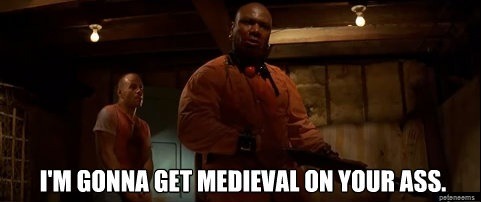I am perpetually fascinated by the way that “medieval” is code for barbaric, backwards, savage, and the like. The phrase “get medieval” seems to have originated (or at least moved into widespread use) as a result of Pulp Fiction, in which Ving Rhames’ character, after being freed by Bruce Willis’ character, tells his rapist that he’s going to “get medieval on [his] ass.” From there, the phrase moved comfortably into mainstream use.
For example, here’s a St. Louis football writer criticizing the Rams for not getting involved in Free Agency. He describes free agency as:
This was the NFL’s version of Black Friday, when roaming gangs of
berserk shoppers invade department stores to dive on laptops, have MMA
brawls over the trendiest toys, blitz the video-game aisle, and go
medieval over the dwindling supply of flat-screen TVs.
I like to point out that the twentieth-century was, by far, the most brutal era for human-on-human violence in the history of our species. Medieval people tortured, but were not more inventive about torture than we are now, especially given the clever things we can do with modern tools and electricity. Medieval people were not more savage than the ancient Greeks and Romans (look up the real meaning of the word “decimate,” or follow through on all the massacres in Thucydides). And yet, the myth persists. It’s useful.
Here’s an example that genuinely upset me. I am an anti-anti-vaxer. Which is to say I have critiqued the anti-vax movement for The Atlantic and CNN and I write about it on the blog. I am particularly interested in the ways in which the anti-vax movement reveals attitudes about disability, as well as more general questions of epistemological processing behind fear-based parenting. So I like this essay, “The Vaccine Battle Is Not Part of the Mommy Wars,” because it’s trying to push conversation about vaccines away from parenting philosophies and into the world of public health policy. But then I came upon this paragraph (emphasis mine):
We cannot place the blame for the anti-vaccination nonsense solely at
the feet of “crunchy” or “natural” parents, though there are many in
that community who delay or completely withhold vaccinations. Being a
somewhat crunchy parent myself (natural birth, cloth diapers,
exclusively breastfeeding, cosleeping, etc.), I encounter the sentiment
“I feed my kids only organic and non-GMO foods, so I feel safe not
vaccinating them” quite frequently. These parents seem to believe that
several hundred years ago, before GMOs or pesticides existed, there were
no communicable diseases. Other groups of parents, like ultra-religious
Jews in Brooklyn, also withhold vaccinations, as well as some
Christians. And then there are the former MTV stars like Jenny McCarthy
and Kristin Cavallari, who have been public about their fears over
vaccines causing everything from autism to asthma to allergies. This
diverse group of parents has one thing in common: they are all putting
us at risk for a return to the Middle Ages.
No. They’re not.
Medieval people were, overall, relatively savvy about healthy given the context of the era. They didn’t have germ theory. Neither did the Renaissance. Neither did the 17th century. Neither did antiquity.
Anti-vaxxers are rejecting an effective, well-tested, well-explained, set of preventative treatments. The knowledge is there for them, but in this rejection of science, they are deliberately rejecting the best available information.
This is not medieval. It’s also not classical, baroque, renaissance, or furturistic.
It’s dangerous. And very, very, modern.

I recently came across an article on npr that dealt with some Americans' beliefs in conspiracy theories. I was delighted to find that one of the main conspiracy theories someone had used to look into how widespread such beliefs were was vaccination avoidance.
That's really what it comes down to, isn't it? A change in rhetoric from 'sides' and 'opinions' to 'denial of science' and 'beliefs in conspiracy theories'.
(I know this is not the main point of your essay, just making conversation.)
Here's the article in case you haven't seen it yet: http://www.npr.org/blogs/health/2014/03/19/291405689/half-of-americans-believe-in-medical-conspiracy-theories?utm_medium=facebook&utm_source=npr&utm_campaign=nprnews&utm_content=03192014
I like conversation! And yeah, there's a fundamental American epistemology that for many people, the secret unlikely answer seems probable.
When I've written about Jenny McCarthy in the past, I focused on the reaction of the special-needs parent to diagnosis, and how anti-vax sentiment feeds a certain kind of emotional response to that situation. But I think the broader adoption of these views does point to American conspiracy thinking, yeah.
I think that "Middle Ages," in the second block quote, is simply a reference to the Black Death.
Maybe, but I actually know a fair amount about the rational and non-rational responses to the Black Death, and anti-vax is very much a different kind of thing. It requires modernity in order to reject it in the way they do.
I repeat: the author is simply saying that the anti-vaccination movement is putting us at risk of another pandemic, like the Black Death. Admittedly, he could have said that the movement is "risking a return to 1919" – so yeah, "medieval" here has that extra frisson of "backwardness" about it. But trying to rehabilitate the Middle Ages from humanist calumny in popular consciousness seems futile. Besides, I think that secretly medievalists enjoy the attention.
Well, I'm a medievalist and I don't enjoy the attention. I do, however, find that exploring medievalism and other ways in which we use and misuse the past to be both interesting and important.
Thanks for the comment.